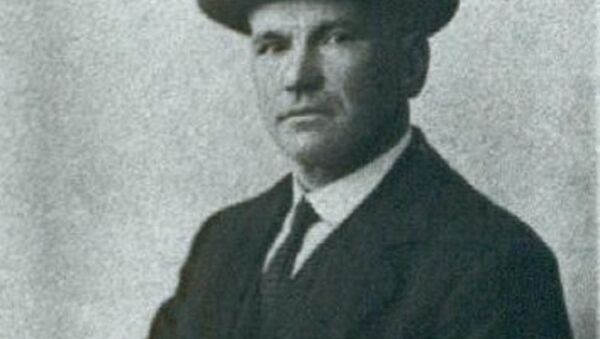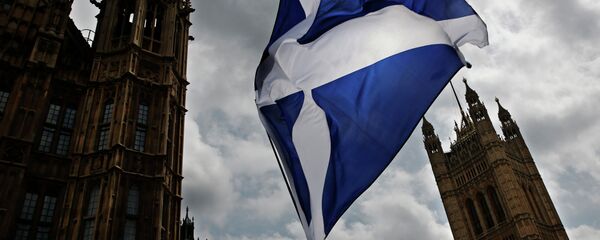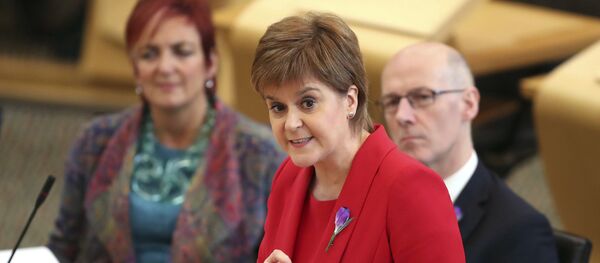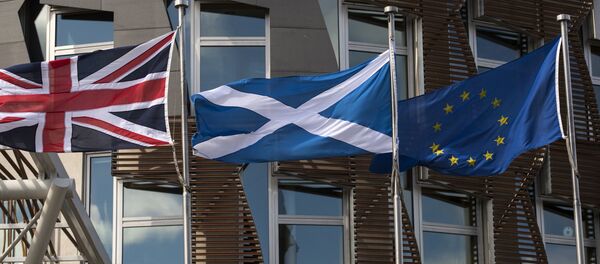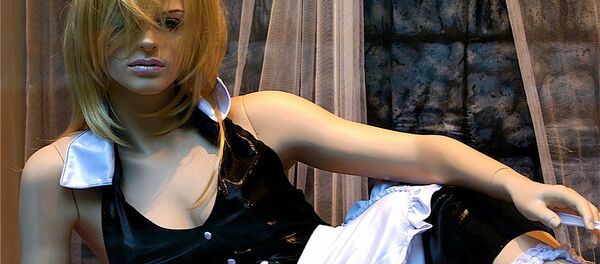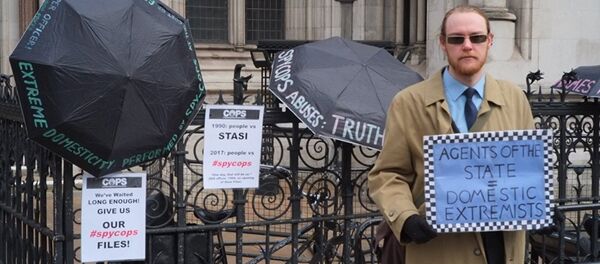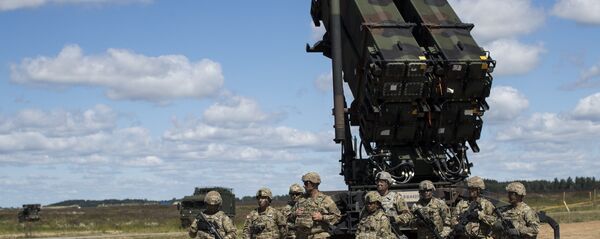He left behind a devoted wife Agnes and two daughters, Jean aged 12 and Nan aged 10.
What frustrates me most at this time of year is the lack of knowledge across Glasgow, never mind Scotland, of who John MacLean was. Most Scots will know of or heard of, St Andrew as this day is designated St Andrews Day in Scotland and was made a public holiday in 2007 by the Scottish Parliament as he is our Patron Saint.
READ MORE: Brexit Could Influence Scottish Voters Toward Independence From UK — Poll
He was apparently one of the 12 Apostles and was crucified in Greece in 60 AD for his beliefs but chose to be crucified on a diagonal cross rather than a proper one as he felt he was not worthy of being crucified on the same type of cross as Jesus Christ. Thus the diagonal cross design on the Scottish flag, the Saltire.
It is an interesting story. Some believe it and others are not convinced. Either way my appeal to fellow Scots, and socialists across the world, is that you remember today someone who not only set foot in Scotland but dedicated his life to fighting for its freedom from imperialist rule.
Someone who campaigned with every fibre of his body against imperialist wars, grinding poverty, low pay, inadequate housing and for a fairer and more just socialist society, a Scottish Workers Republic as part of a socialist world. Celebrate John MacLean.
Heed the words of the legendary Scottish Poet Hugh MacDiarmid who immortalised MacLean in his 1943 poem ‘Krassivy, Krassivy’:
Scotland has had few men whose names
Matter- or should matter- to intelligent people,
But of these MacLean, next to Burns, was the greatest
But it should be of him, to every Scotsman and Scotswoman
To the end of time, as it was of Lenin in Russia.
When you might talk to a woman who had been
A young girl in 1917 and find that the name of Stalin lit no fires
But when you asked her if she had seen Lenin
Her eyes lighted up and her reply
Was the Russian word which means
Both beautiful and red.
Lenin, she said, was “krassivy, krassivy”.
John MacLean too was krassivy, krassivy
A description no other Scot has ever deserved.
Here is an intellectual colossus of Scotland urging us to remember MacLean in the same way we remember Rabbie Burns and comparing him with Lenin of Russia. Yet up until the age of 17 I had never even heard of John MacLean let alone learned about him. Modern Studies and History were my favourite subjects at school but there was no mention of MacLean in any of my lessons.
READ MORE: There's Opposition to Nukes' Presence in Scotland — Activist
I was born in Govan were MacLean taught. I was raised in the Pollok housing scheme within a couple of miles of MacLean’s Pollokshaws home but only when I was handed a copy of the Nan Milton (John’s daughter) book ‘John MacLean’ at a political meeting in Stirling University in 1981 did I discover the man and his ideas. They have inspired me and shaped my own political outlook and development ever since.
He lived in a revolutionary period of history and he helped shape that period through words and deeds. I urge you to do yourself a favour and read about MacLean. Immerse yourself in one or more of the excellent books that have been written by him or about him. The ‘Rapids of Revolution’ is an incredible collection of his speeches, articles and letters. The Nan Milton book I mentioned earlier is simply called ‘John MacLean’ and contains everything you need to know. I was humbled and honoured to be asked by the John MacLean Society in 2002 to write the foreword for a re-print of that book. A new book called ‘The Red and the Green – A Portrait of John MacLean’ by Gerry Cairns was printed last year and is an excellent addition to the treasure trove of comment and analysis of MacLean’s life. This book throws new light on the role MacLean paid in assisting the Irish Uprising of 1916 and uses rarely accessed papers to illustrate some of the political and practical work MacLean was involved in to support the Irish Republican cause.
A column is by definition inadequate to properly celebrate and remember the rich revolutionary life of someone so embroiled in the movement as John MacLean was but my intention here is to wet your appetitive and encourage you to conduct your own research after reading this snapshot. Remember the context of MacLean’s’ life was the tumultuous First World War of 1914-18 and the revolutions which it spawned during and after it as workers sought a better life than that of wage slaves and cannon fodder for the boss class.
'He (the Lord Advocate [one of Scotland’s top legal prosecutors]) accused me of my motives. My motives are clean. My motives are genuine. If my motives were not clean and genuine would I have made statements while these shorthand reporters were present? I am out for the benefit of society, not for any individual human being, but I realise this, that justice and freedom can only be obtained when society is placed on a sound economic basis. That sound economic basis is wanting today, and hence the bloodshed we are having…. The whole history of society has proved that society moves forward as a consequence of an under class overcoming the resistance of a class on top of them….'
'I wish no harm to any human being, but I, as one man, am going to exercise my freedom of speech. No human being on the face of the earth, no government is going to take from me my right to speak, my right to protest against wrong, my right to do everything that is for the benefit of mankind. I am not here, then, as the accused; I am here as the accuser of capitalism dripping with blood from head to foot.' (Speech from the dock, May 9th 1918; ‘Rapids of Revolution’ p100-101)
These are short excerpts from an extraordinary speech which took seventy-five minutes to deliver. It is a speech seething with rage concerning the futility and carnage of war. It is bursting with detailed political commentary and historical references and facts. But most of all it is a call to arms to the working classes of Scotland and the world to rise up and take power in society and follow the lead of the Bolsheviks in Russia.
READ MORE: You Shall Not Pass: Scottish FM Sturgeon Vows to Block 'Blindfold Brexit' Deal
What makes it extraordinary however is it wasn’t delivered from a stage in a hall or from a platform during a rally it was delivered in the highest court in Scotland on May 9th 1918, in front of a disgruntled judge, disparaging advocates, a jury and a packed Edinburgh High Courtroom.
This was John MacLean at his finest refusing to be cowered by the serious sedition charges he stood accused of for opposing the First World War publicly, encouraging working class men to defy conscription and supporting workers getting organised and striking for better conditions and higher pay in the overworked munitions factories, shipyards and mines across Scotland. It was the third occasion John MacLean had appeared in a Scottish court accused of sedition and offences against the Defence of The Realm Act (DORA) which was specifically introduced by the Lloyd George government during World War One to suppress any dissent, spy on and arrest opponents of the war, shutdown socialist newspapers and ban public gatherings.
John MacLean was found guilty on that day in May in 1918 and sentenced to 5 years of penal servitude in Peterhead prison. He had previously been found guilty of similar charges in November 1915 in Glasgow Sheriff court when he admitted stating publicly at a rally in response to a heckler who shouted ‘enlist’ at him;
'I said ‘I have enlisted in the Socialist Army for fifteen years, the only army worth fighting for. God damn all other armies.' (Speech from the dock, November 1915; ‘Rapids of Revolution’ p93)
Seeking to profit from the increased demand for housing on the Clyde during the First World War private landlords imposed rent increases and threatened those unable to pay with evictions. The women of Govan and Partick were having none of it. Their husbands and sons were conscripted to fight on faraway battlefields but now faced eviction from their homes. Organised by the legendary Mary Barbour and with assistance from John MacLean they organised rent strikes and physically repelled sheriff officers despatched to evict those in rent arrears.
Tens of thousands took part and on 17th November 1915 18 women rent strikers were summoned to court to face eviction proceedings. Thousands of shipyard workers downed tools and walked out in support of the women and John MacLean was invited to speak outside the court. Fearing a social uprising the sheriff made contact with the government in London and within days the Rent Restriction Act was implemented reducing rents to their pre-war 1914 levels and forbidding any rises during the duration of the war. The battle was organised and led by the women but they trusted and relied upon John MacLean for political support.
In February the following year 1916 MacLean was again arrested on charges of sedition alongside other trade unionists and political activists like Willie Gallagher (future Communist MP for Fife), Manny Shinwell (future Labour Party MP) and John Muir of the Clyde Workers Committee, a rank and file body of trade union shop stewards from across various factories and shipyards.
John MacLean was arrested and imprisoned 5 times during his relatively short life. In prison he faced rough treatment from the authorities including deliberate sleep deprivation and forced feeding when he refused to eat food he claimed was poisoned. On several occasions MacLean was released early from prison due to public pressure. He may have been on the wrong side of the law throughout his life but he was always on the right side of the people.
READ MORE: Alyssa Milano Teased as She Offers Her Ribs to SCOTUS Justice
John MacLean was a very keen reader and devoured the writings of Marx and Engels. By the time he became a school teacher in 1900 he was already a devout socialist and convinced Marxist. So evangelical was MacLean about his socialist and Marxist beliefs he dedicated himself to adult education classes in Marxist economics on street corners in Glasgow, inside the massive Glasgow Green Park and in other Scottish cities. His free political education classes became legendary and attracted hundreds of workers thirsty for knowledge.
MacLean was an avid writer and submitted hundreds of articles to newspapers and left wing publications. He was constantly involved with various socialist papers and parties throughout his life. He was in the Social Democratic Federation and the British Socialist Party before forming his own Scottish Workers Republican Party in April 1923. Space prohibits detailing the travails of the political disputes and fallouts which surrounded MacLean but it is safe to say that he never once sold out his class or diluted his principles to secure a comfortable political career.
MacLean was an all-round revolutionary. An orator, a writer, a teacher and an organiser. He faced down the early whipped up jingoism in Glasgow at the beginning of the war and carved out a reputation as a consistent and courageous proponent of peace. The police and security services soon had him earmarked as a trouble-maker. It was the head of British Military Intelligence at the time, Basil Thompson, who labelled him ‘the most dangerous man in Britain’.
MacLean was greatly influenced by both the Easter Uprising in Ireland in 1916 and the Russian revolution of 1917. These were events which heartened MacLean and illustrated the possibilities for revolution in Scotland. MacLean was named the Soviet Consul in Glasgow by the first workers government in the world while James Connolly and other leaders of the Easter Uprising and elected Sinn Fein MPs like Constance Markievicz spoke highly of MacLean and shared platforms with him.
READ MORE: Briton Spots a Plane 'Underwater' Off Coast of Scotland — Reports
So although there is a street named after John MacLean in St Petersburg and a commemorative stamp was produced by the Soviet government in his honour MacLean refused to tow the party line in respect of uniform Communist discipline and latterly in his life promoted the Scottish road to socialism as opposed to the British road;
'Scottish separation is part of the process of England’s imperial disintegration and is a help towards the ultimate triumph of the workers of the world.' (23rd November 1923 Gorbals General Election Address: p248 ‘Rapids of Revolution’)
MacLean projected internationalism from a Scottish perspective. His socialist vision was still worldwide but his focus was his country. He was advocating thinking globally but acting locally. Those socialists who would lazily cast such a position as nationalistic have to raise their game and analysis. Internationalism is inter-nation relationships. Britain is not a nation. Scotland is a nation. Advocating an independent socialist Scotland, a democratic republic, is entirely consistent with internationalism.
John MacLean was human. He is vulnerable to the criticism that he put the socialist cause before his family. His five terms of imprisonment, constant speaking tours and election campaigns and dismissal from his teaching job all took their toll on his family life and his health. He was often without any income and apart from his daughters. His wife Agnes was devoted but also estranged. Yet more than any other figure in Scotland’s rich political tapestry John MacLean deserves to be remembered, celebrated and respected. He did more than anyone to forge the Scottish link in the world chain of socialism.
The views and opinions expressed in this article are solely those of the contributor and do not necessarily reflect Sputnik's position.
